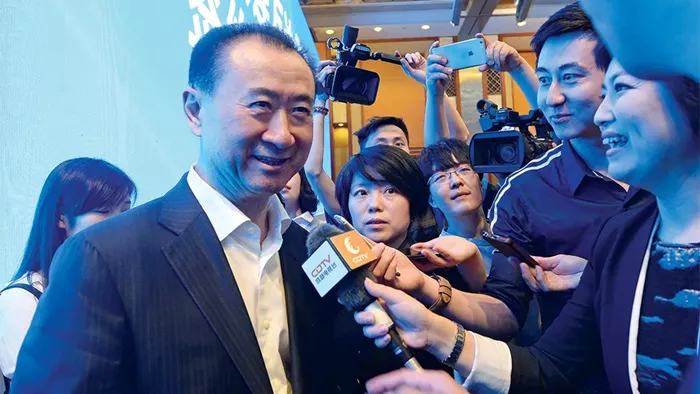Wang Jianlin, the Chinese billionaire who previously tried to buy a controlling stake in Hollywood, is preparing for his imminent exit from the film industry. The troubled conglomerate is under pressure to repay debt.
Wanda Film, which remains China’s largest cinema operator, said in a regulatory filing with the Shenzhen stock exchange on Wednesday that Wang and his Wanda Investment vehicle expect to sell their remaining 51% stake in the company to China Ruyi Holdings.
Ruyi, which has interests in film, TV and online games, counts gaming, social media and streaming giant Tencent among its biggest shareholders. Hong Kong-listed Ruyi previously bought 49% of Wanda Investment for $320 million (RMB2.3 billion) in July.
Ruyi has not commented on the pending deal. The Wanda Film filing asked for a two-day suspension of its shares, saying simply: “If the above matters are finally implemented, it will result in a change of control of the company.
Wang, a former army officer turned property developer, became one of China’s richest people thanks to a chain of upmarket shopping malls and luxury hotels. With a fortune once estimated at $46 billion, Wang was known as a stickler for punctuality and lavish luxury. He sometimes travelled in two private jets – one for himself and one for his luggage.
In 2012, he burst onto the world’s entertainment stage with the $2.6 billion acquisition of US cinema chain AMC. He followed that up by buying: Carmike theatres in the US, Hoyts, the Australian cinema operator, the Hollywood production company Legendary Pictures, the powerful sports rights agency Infront and a stake in the Atletico Madrid football team.
Wang and Wanda also built theme parks and threatened to drive Disney out of China when the Mouse House opened the Shanghai Disneyland theme park in 2016.
Wanda bought a prominent site in Beverly Hills where the Robinsons-May department store once stood and, after a lengthy campaign, won approval for a $1.2 billion hotel, apartment and office complex. Wang proposed it as the group’s global film headquarters.
Wang and his lieutenant Jack Gao are said to have sought to buy stakes in several Hollywood conglomerates. Wang expressed ambitions to reshape the global film distribution system by combining ownership of Hollywood studios with control of the world’s largest cinema distribution chain.
But when the Chinese government intervened in mid-2017 to block banks from lending the already heavily indebted company money for Wanda’s overseas asset purchases, it signalled the end of Hollywood’s love affair with China, Chinese money and its selfish tycoons.
Soon after, Wanda began selling off some of its assets. The first were the theme parks, which had failed to intimidate Disney, and a number of hotels. Later, it jettisoned the Movie Metropolis film studio, festival centre, yacht marina and residential complex in the coastal city of Qingdao, which it had launched with a parade of Western stars in 2013 and finally opened in 2018.
The Chinese asset sales did not seem to be enough and, despite the subsequent sale of some overseas assets, Wanda has been on the sick list ever since. It has exited AMC piecemeal, sold the undeveloped Beverly Hills site and reduced its stake in Legendary. It has put Hoyts on the auction block, but has yet to complete a sale.
Wanda may have been one of the first of China’s property developers to get caught up in the heavy borrowing that took place at a time when the Chinese economy was booming and the price of everything seemed to be going nowhere but up. But with even bigger property developers, including Evergrande and Country Garden, also in deep trouble and weighing heavily on China’s post-COVID economic recovery, he is not alone.
Bloomberg estimates that Wang’s net worth has plummeted to around $6 billion.
























